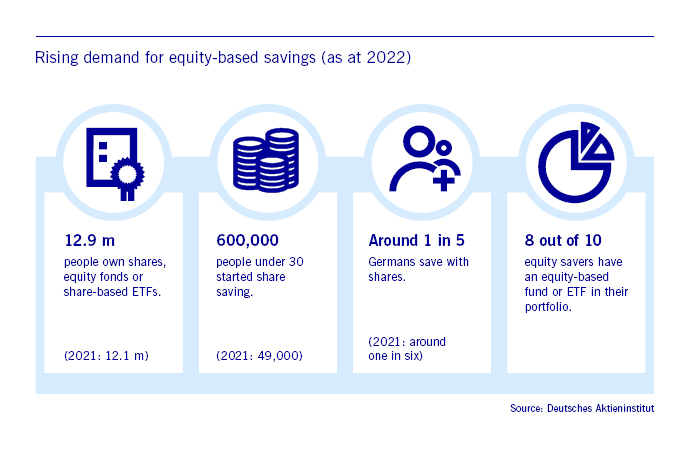financial education
Education promotes equal opportunities Especially when it comes to finances
Can you explain what inflation is? Do you know precisely what happens on the stock exchange? How much time do you spend on decisions about your finances and providing for your old age? Financial literacy is more important to Germans than issues such as health, politics, diet or sport. Nevertheless, the level of economic expertise in Germany is pretty poor. And yet the issue of old-age provision is growing in importance, especially in view of demographic change. Economic literacy is the basis for investment decisions that accompany us our whole life. That is why all citizens should have access to general financial education. Only then, equal opportunities can be created.
That tweet provoked intense discussions about the financial literacy of students. According to a survey asking participants whether they had ever received financial education, 50 percent of Germans said they had not; the average for Europe is just below that figure. Most believe that families and schools should provide such education, but also regard policy-makers and public authorities as being responsible.
No financial literacy, no economic independence
Economic literacy strengthens consumers’ powers of judgement in many everyday matters. A good financial education is part of economic literacy. It helps us build wealth, handle debt, understand insurances and deal with everyday matters relating to money and securities. Anyone lacking this basic knowledge cannot be economically literate, responsible or independent.
Trust in financial markets has suffered as a result of the financial crisis. Moreover, the level of education in money and financial matters among Germans is poor to inadequate, according to teachers, politicians, journalists and financial advisers.
At the same time, many Germans overestimate their financial knowledge.
A lack of knowledge about insurance, old-age pensions and investments in shares or funds produces uncertainty and even fear – the fear of supposedly risky investments. Instead, people invest in what they believe is “safe” call money or endowment policies. Yet, they allow negative interest rates and inflation to gradually reduce their assets.
Despite a high savings rate, German households invest little in shares compared to other countries: for example, as of 2021, in the USA roughly 50 per cent of the populations invests in shares. In Sweden, investment in shares is mandatory for old-age provision which is why around 52 per cent of Swedes invest in shares.
Just every one in five Germans invests in shares (source: Deutsches Aktieninstitut). In Germany, there are billions of euros sitting in call money accounts where assets are even shrinking due to low return. However, a trend can also be observed that the number of equity savers in Germany is going up – in fact, it has never been higher.

We need a national strategy for more financial literacy
Increasing importance is being attached to financial literacy in Germany: The federal state of Baden-Württemberg made economics a compulsory school subject in 2016. The issue is also on the political agenda in Hesse. By establishing them as a separate subject, economic sciences and career guidance for pupils could be lastingly entrenched in school education. Fields of knowledge, such as consumer education, general financial education, entrepreneurship and career guidance should therefore be a integral part of school education.
Financial education at Deutsche Börse Group
Deutsche Börse Group offers a board range of training and education for every stage of life and tries to reach every group in an age-appropriate way. That begins at preschool age and is intended to support children and youngsters gain an economic education throughout their time at school. General financial education is also offered for people already in the workforce. Deutsche Börse Group supports and promotes financial literacy in Germany because that knowledge has an impact on growth, employment opportunities and prosperity in our country.
With its special offer for private investors Deutsche Börse Group imparts knowledge about exchange trading and different types of securities.
FurthermoreBörse Frankfurt provides a free online service (German only) for newcomers as well as experienced investors. Regardless of place and time, it provides the possibility to gain understanding of trading at the exchance with entertaining explainity videos, online lectures and tutorials.
Around 100 times a day, various TV stations report to the entire world from the trading floor of the Frankfurt Stock Exchange – the only one of its kind in Europe – and make the issue of stock exchanges and trading visible to a wide audience, especially in Germany.
Some 50,000 visitors – including many students – take part in free introductory talks every year and get the chance to experience trading on the stock exchange live.
Information on the Internet: anyone interested in capital market topics can find more information, videos and webinars on the websites of Börse Frankfurt and Deutsche Börse Group.
Deutsche Börse Group
Headquartered in Frankfurt/Main, Deutsche Börse Group is one of the largest exchange organisations worldwide. It operates markets that provide integrity, transparency and security for investors wishing to invest capital and for issuers wishing to raise capital. On these markets, institutional traders buy and sell shares, derivatives and other financial instruments in accordance with clear rules and under strict supervision.
Deutsche Börse Group is now more than just a trading venue or exchange – it is a provider of financial market infrastructure. Its business areas cover the entire financial market transaction process chain. This includes the provision of indices, data and analytical solutions as well as admission, trading and clearing. Additionally, it comprises services for funds, the settlement and custody of financial instruments as well as the management of collateral and liquidity. As a technology company, the Group develops state-of-the-art IT solutions and offers IT systems all over the world.